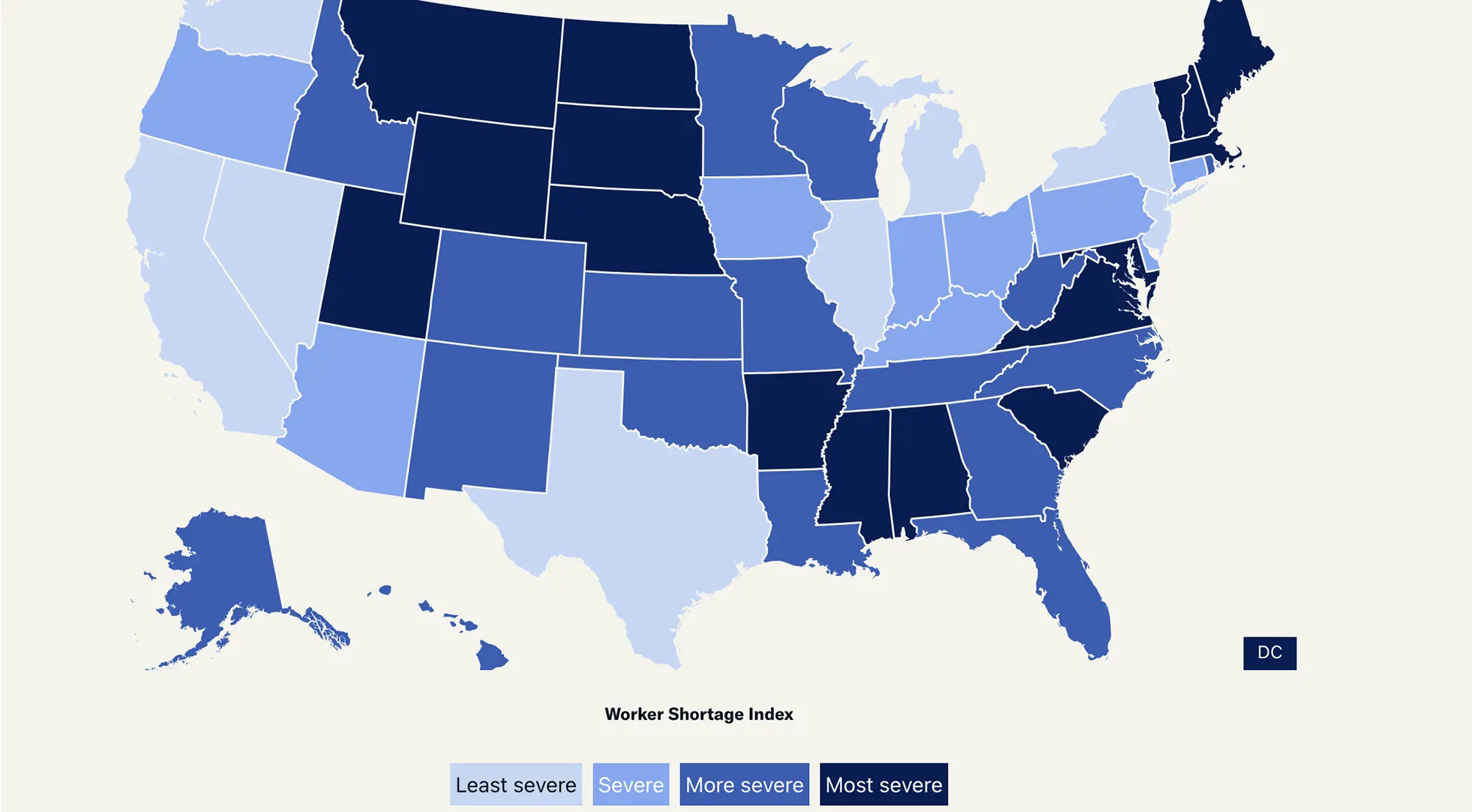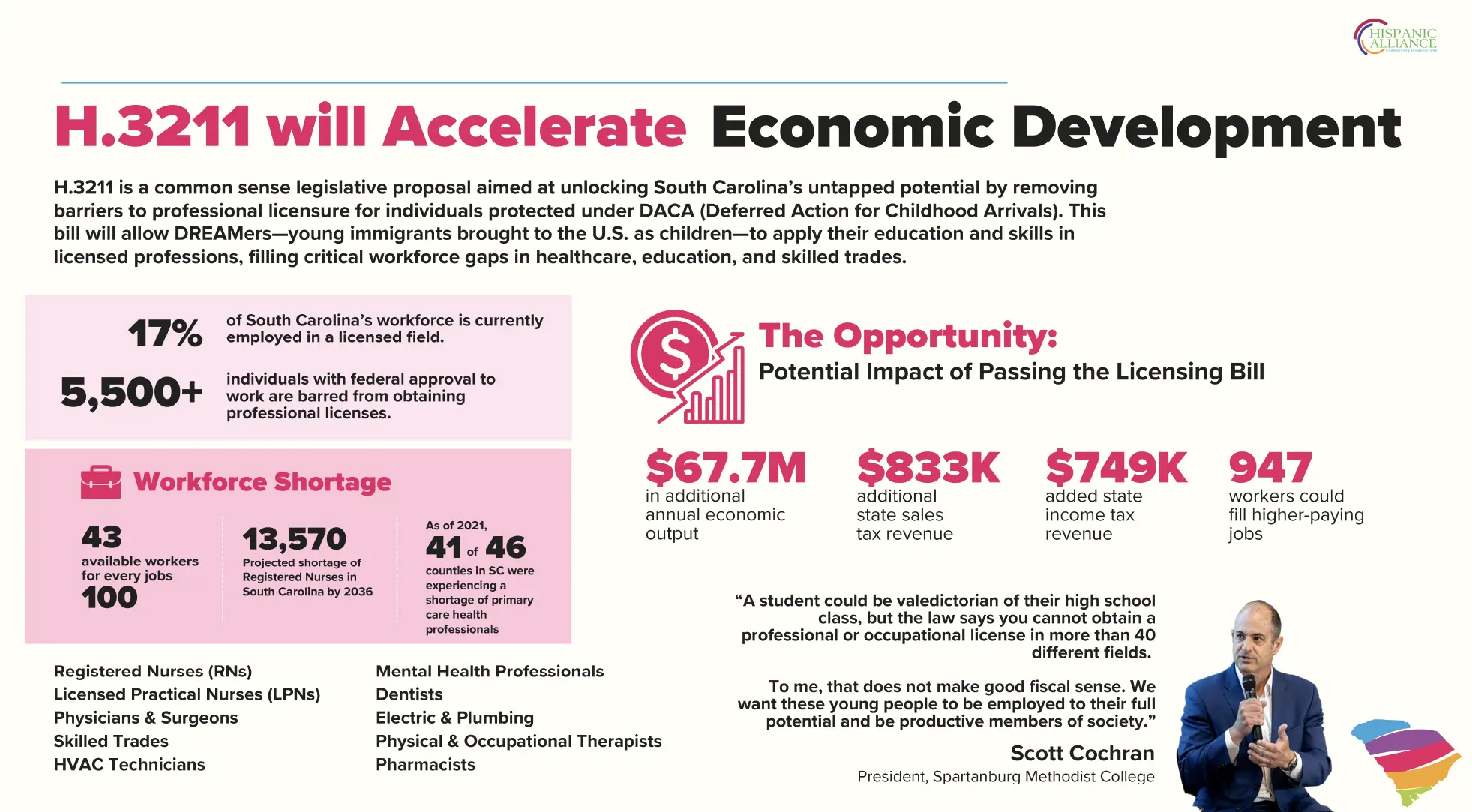Modernizing South Carolina’s licensing laws through House Bill 3211 (H.3211) offers an opportunity to strengthen the state’s economy, expand opportunities for legally authorized workers, and help businesses thrive. By addressing outdated regulations, this legislation could unlock the potential of South Carolina’s workforce and ensure that industries critical to the state’s growth have the talent they need.
A Growing State with Workforce Challenges
South Carolina is one of the fastest-growing states in the country, with its population increasing by 1.71% in 2023 alone.1 This growth reflects the state’s attractiveness as a place to live and work. However, rapid expansion has also highlighted gaps in workforce availability. For every 100 job openings in South Carolina, there are only 43 available workers—a ratio that underscores the challenges businesses face in filling critical roles across industries such as healthcare, education, and construction.2
H.3211 seeks to address this issue by allowing individuals with valid federal work authorization—such as DACA recipients, TPS holders, and asylum seekers—to apply for professional licenses. These individuals already have the legal right to work in the United States but are currently excluded from obtaining state-issued licenses required for many professions. By removing this barrier, South Carolina can tap into a pool of skilled workers ready to contribute to its economy.

Unlocking Economic Potential Through Licensing Reform
Workforce shortages can slow economic growth by limiting business productivity and increasing costs for consumers. H.3211 offers a practical solution by enabling legally authorized professionals to enter licensed fields without unnecessary delays or restrictions. These are not new jobs being created—they are existing positions that remain unfilled due to regulatory barriers.
The potential economic benefits of this reform are significant. Allowing an estimated 947 additional workers to obtain licenses could generate up to $67.7 million in additional economic output annually.3 Workers moving into licensed professions typically earn higher wages, which translates into increased consumer spending and stronger local economies. Moreover, these changes could add $1.58 million in state tax revenue through higher income and sales taxes—funds that can be reinvested into schools, infrastructure, and community services.4

Strengthening Key Industries
South Carolina’s workforce challenges are particularly acute in industries vital to its economy. H.3211 ensures that qualified individuals who meet all licensing requirements can step into these roles without being held back by outdated policies.
- Healthcare: The state is projected to need 13,570 registered nurses by 2036, one of the highest shortages nationwide.5 Additionally, 45 out of 46 counties lack sufficient primary care providers.6
- Education: At the start of the 2023-24 school year, South Carolina reported 1,613 vacant teaching positions—a 9% increase from the previous year.7
- Construction and Skilled Trades: Electricians (13% projected job growth by 2030)8, plumbers (660 annual job openings)9, and carpenters (1,150 projected job openings by 2030)10 are all in high demand.
Supporting Businesses and Communities
South Carolina’s businesses stand to benefit significantly from modernizing licensing laws. Employers often face hiring delays due to a lack of qualified applicants or lengthy training processes. By expanding access to professional licensure for legally authorized workers already residing in the state, H.3211 reduces these delays and broadens the talent pool for critical jobs.
This reform also helps retain businesses that might otherwise relocate due to workforce shortages. In an increasingly competitive labor market, ensuring access to skilled professionals is essential for keeping South Carolina’s economy strong and vibrant.
Why Now Is the Time for Action
South Carolina is not alone in recognizing the need for licensing reform. States like Illinois, Texas, and California have already updated their laws to allow legally authorized immigrants access to professional licensure in healthcare and other key industries. These changes have helped address labor shortages while boosting local economies.
By passing H.3211, South Carolina has an opportunity to remain competitive on a national scale while ensuring that its workforce policies reflect modern realities.
- Population Estimates & Projects, SC Revenue and Fiscal Affairs Office, 2023 (Source) ↩︎
- U.S. Chamber of Commerce, Workforce Data, August 2023. (Source) ↩︎
- The Lost Economic Impact of DACA Eligible Students in South Carolina, 2024 (Source) ↩︎
- The Lost Economic Impact of DACA Eligible Students in South Carolina, 2024 (Source) ↩︎
- Bureau for Health Workforce, Nurse Shortage Projections, 2024. (Source) ↩︎
- South Carolina Health Professions Data Book, 2021 (Source) ↩︎
- Center for Educator Recruitment Retention and Advancement, SC Teacher Shortages, 2023. (Source) ↩︎
- ONET, SC Electricians Job Growth, 2024. (Source) ↩︎
- ONET, SC Employment Trends: Plumbers, Pipe Fitters, and Steam Fitters, 2024 (Source) ↩︎
- ONET, SC Carpenters Job Projections, 2024. (Source) ↩︎


